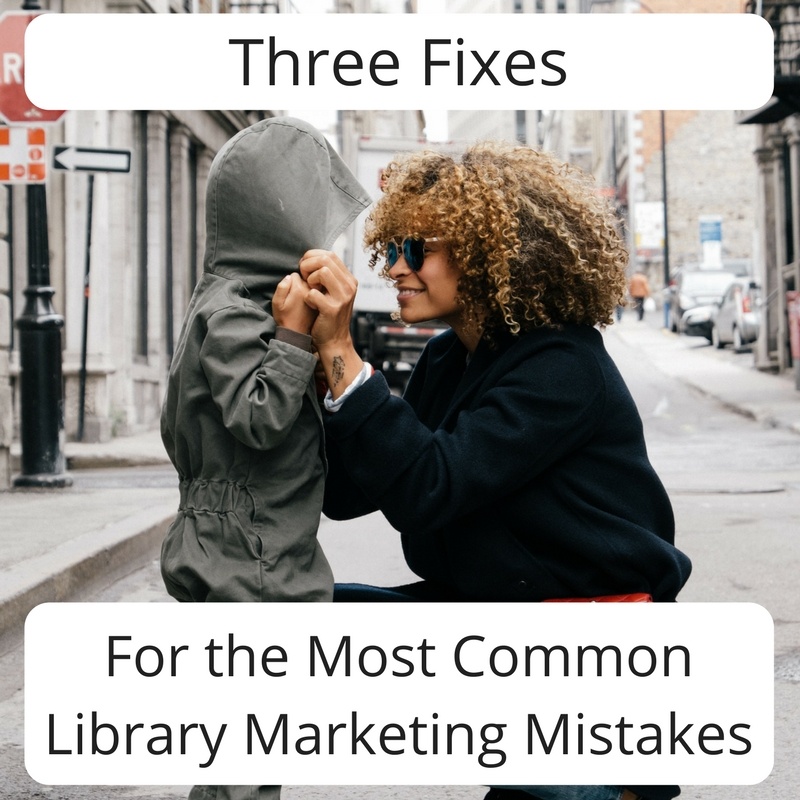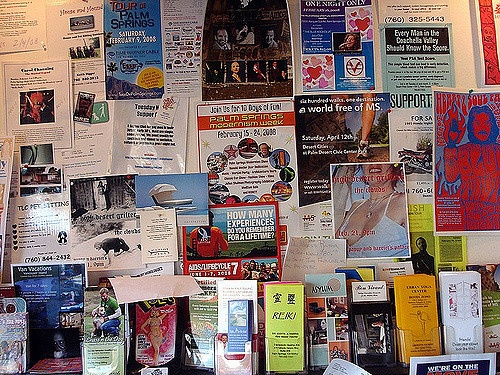3 Fixes for The Most Common Library Marketing Mistakes
Despite our best intentions, marketing mistakes can block our customers from the resources they could use and love. Here, then, we offer 3 practical solutions.

Marketing, in the library world, is how we communicate our value to the people we serve. With effective marketing, we help potential users understand the appeal and the value of our resources and even hold their hand just to the point that they feel competent using them on their own. When our marketing is ineffective, many potential users simply won't understand or use what we have to offer. For those users, it doesn't matter that we've put a link on our website or a record in our catalog. It doesn't matter how great the resource is or what problems it might solve. If our customers can't connect our resources with their needs, it's the same as if we weren't providing access at all.
This short article describes 3 common library marketing mistakes... things that, despite our best intentions, may be blocking our customers from the resources they could use and love. And with each mistake described here, we offer a practical solution.
Mistake 1: "We have something for everyone."
While this marketing message may be true (or almost true), it doesn't speak meaningfully to anyone in particular. No one who reads this message will feel inspired to say "Wow, that's great. I think I'll go hunt through the website and find the thing that's for me."

The cure for this messaging mistake is to get more specific. Rather than a weak and overly general message, choose a specific audience and highlight the thing that's for them. Consider the contrast between "something for everyone" and the following more specific message:"Do you commute? We have e-Audiobooks that will make you look forward to your daily drive." It's true that a message like this won't reach everyone, but if you're thoughtful, you're almost guaranteed to make a real connection with someone. No amount of general messaging comes close to the impact of one message that makes a customer feel like someone is paying attention and speaking directly to her. At intervals, you can change what message is being highlighted, and with patience over time, you will effectively communicate what it is that you have for each of the someones in "everyone".
Mistake 2: The Message Barrage
A close cousin of Mistake 1 above, a message barrage is an attempt to prove you have something for everyone with a jumble of too many messages in one confined space--a single web page for example. The effect of too many messages is like a public bulletin board gone to seed. One message impinges on another until no message really gets a fair hearing. Most of what you want to communicate is drowned in the general noise and only the knowledgeable and very determined can navigate through successfully.

The fix for this mistake is the same as for #1: select individual messages for highlighting and cycle through a series of messages over time. One important thing to note, when you're focused on a specific message, you should use every available medium to promote that message. Use prominent website placement, certainly, but also printed flyers, table tents, Facebook ads, conversation starter handouts at the circulation desk, social media, and even local traditional media. For some great ideas on using local media you might want to check out this recorded webinar with Kathleen O'Dell: 15 Free Ways to Effectively Promote Your Library.
Mistake 3: Library Jargon
The rule of thumb here is that if you find yourself defining the word you use for a resouce more than once, you should consider calling it something else. Patrons won't generally be interested in "databases", for example. They might, however, be interested learning French online for free, or a place to get great ideas for a research paper, or online ACT test prep, or free ready-to-use legal forms... "Databases" is a library insider's word and it's probably a misnomer anyway. "Programming" is another jargon word with a library specific meaning. We use it to refer collectively to everything from storytime, to adult education lectures, to author events, and musical performances.
The best defence against library jargon is to think from a patron's perspective. Put yourself in a patron's shoes and then ask yourself for each specific library offering: How does this enrich my life? What problem does this solve for me? The answer will steer you away from jargon and clarify how to effectively talk about your resources. You'll find yourself talking less about resources collectively and more often highlighting them one by one in terms of their value for real patrons.
Steady Does It
None of the fixes described here will require a new hire, more funding, or more hours in the day. All of them work by applying a new focus to the marketing efforts you're already making. They just require a bit of patience and consistency over time. Interestingly, they also help overcome some of the resistance librarians feel towards marketing. Effective marketing, it turns out isn't about glitz, hype, or false claims. It's about authentice connections between real people.
About the author: